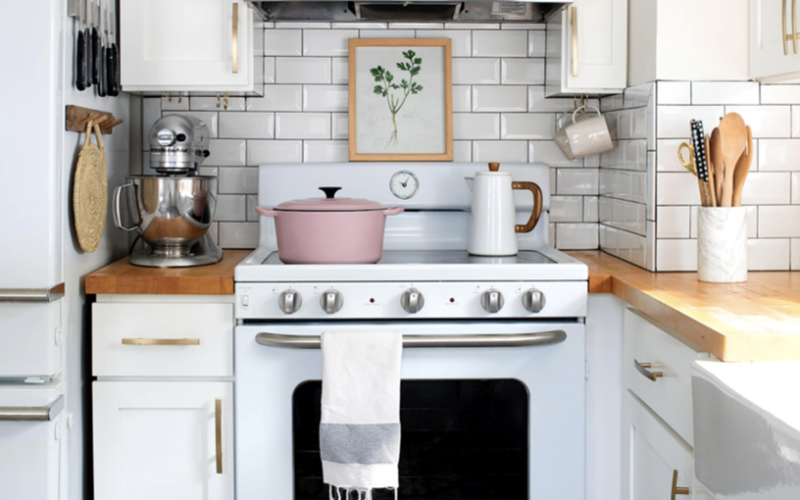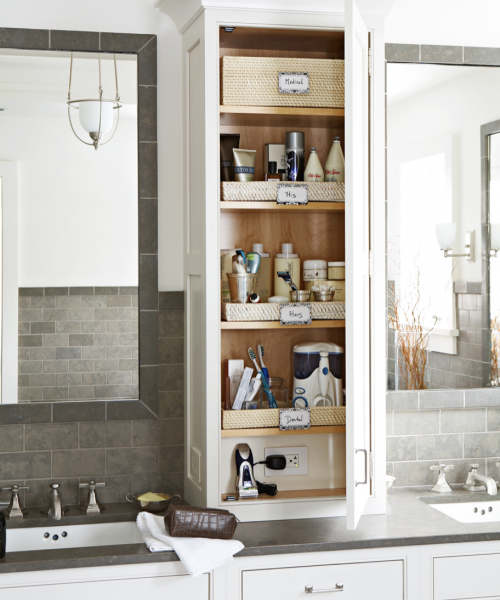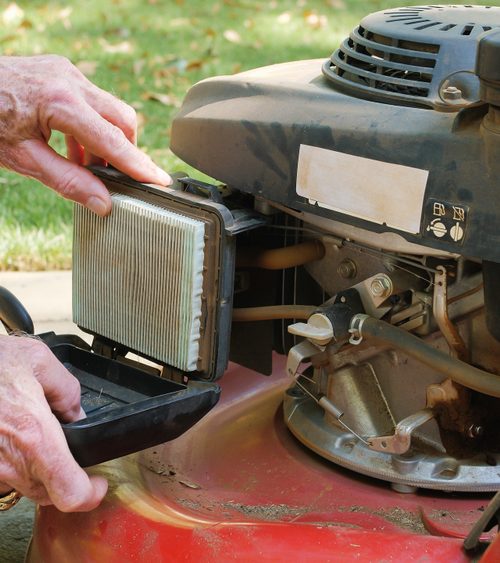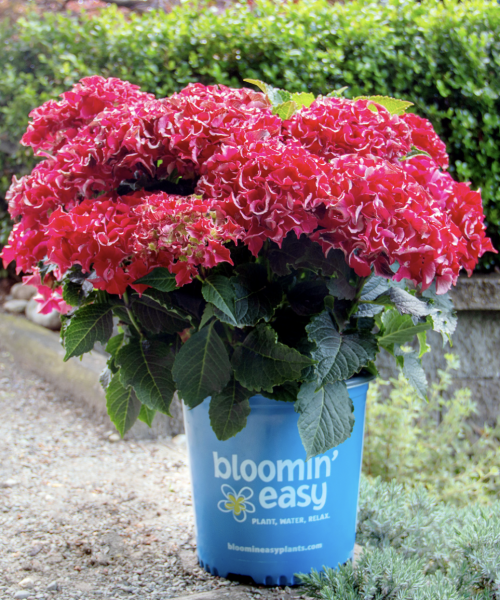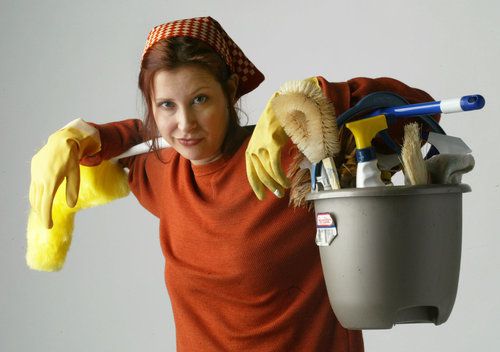By Alicia Chilton and Hannah Bruneman
Troy Warren for CNT #HomeGarden
Spills and splatters are guaranteed in the kitchen, especially on cooktops. But don’t let hardened food stains stand in the way of a sparkling space. Learn how to clean a stove top with these smart ideas for glass tops, gas burner grates, and electric coil burners.
Of all the surfaces in your kitchen, your cooktop probably suffers the most spills, splashes, and stains. Worse still, high heat from the burners can cause messes to become baked-on and difficult to remove. Keep it looking pristine by spot-cleaning minor mishaps at mealtime and dedicating time each week to perform a more thorough scrubbing. A daily wipe-down during your routine kitchen cleaning only requires a quick spritz of cleaner and a swipe with a damp cloth. This quick routine will prevent food and oils from hardening onto your stove top. However, scrubbing your stove top weekly requires a little more work. Whether you have a glass cooktop, a gas stove, or electric coil burners, we’ll show you the best way to rid your cooking surface of any leftover residue and get it in tip-top shape.
How to Clean a Glass Stove Top
Glass-topped electric stoves have become a popular choice over the years. They’re smooth, flat, and almost undetectable on a kitchen counter. Their safety features have improved, too. The latest electric stove tops use induction cooking technology that can boil your water while keeping the cooking surface cool to the touch.
A big selling point for glass stove tops is that they’re easy to clean. And when it comes to this hardworking room, easy-to-clean kitchen featuresare a perk. With a flat surface, wiping with a damp cloth after every meal is barely considered a chore. (Need a little extra cleaning power? Spritz with a little bit of vinegar before wiping.) However, grease splatters and bubbling sauce can build up over a few days of cooking.
One of the most efficient ways for how to clean a glass stove top with tough stains is to pick up a single-edged scraper ($4, The Home Depot) and get to work. The scraper lets you target stubborn buildup and hard-to-clean edges and crevices. Soak the problem area in a cleaner approved for glass stove tops and let it sit. Then, scrape slowly, firmly, and carefully, holding the blade at a low 30- to 40-degree angle. Don’t press too hard and avoid holding the scraper at a high angle so you don’t accidentally crack the glass. Then, wipe the glass cooktop clean with a clean cloth.
For a general, all-over deep scrub, try this method from cleaning company Merry Maids, which features cleaning with baking soda and vinegar, two of our favorite natural cleaners. When the glass stove top is cool, spritz with vinegar and generously sprinkle the stove top with baking soda. Wet a cloth with hot water and wring out any excess moisture. Place the towel over the cooktop and let it sit for 10-15 minutes. Then remove the towel and wipe the cooktop with a microfiber cloth. Spray lightly with vinegar again and wipe with another clean, dry microfiber cloth, buffing out any streaks. Repeat these steps until the residue is gone.

How to Clean a Gas Stove Top
Gas stove tops continue to be one of the most popular stove options. They use a real flame that provides responsive, even heating. Modern gas cooktops offer a range of burner sizes and shapes, so you can always find the right surface for the job. Since your cookware sits atop grates, you can use stoneware or cast iron skillets, which would otherwise scratch a glass cooktop.
Although daily cleaning isn’t as easy as the “wipe and go” method conducive to a glass stove top, the routine is still pretty simple. When the stove top is cool, simply wipe with a damp cloth and cleaner. Pick up the grates and wipe up any spills or crumbs that fell beneath the grates.

How to Clean Stove Burners
From time to time, look under the burner caps to assess if the burner heads need cleaning. Proper gas flow is dependent on clean burner heads. Before starting, ensure all of the burners are off and the stove top is cool. Use a damp cloth to soak up any spills in the burner head and slots. Use a nonabrasive brush, like a toothbrush, to remove any crumbs between the burner slots. Wipe clean with a damp cloth.
Gas stove-top burner heads and other inner working stove parts are intricate and vary greatly from model to model and brand to brand. You’ll want to be well-informed on how to clean the stove burners on your specific appliance so you do not damage the burner and cause it to malfunction or become a hazard. Your owner’s manual will be a helpful reference. Inside, you’ll find instructions specific to your model and diagrams that spell out exactly how to clean your gas stove top. Can’t find your manual? Search the model number (often on a label inside the door) online and you might be able to find a digital version. Or consult the manufacturer’s website, which will often have cleaning tips, how-to videos, and more.

How to Clean Stove Grates
Grates make cleaning a gas stove top more difficult. Grease, oil, and food particles splatter onto the grates and stay there until the buildup becomes noticeable. By then, the sticky residue is stubborn. If the manual for your gas stove top says it’s okay, you can run the grates in your dishwasher on a regular basis. For cooked-on stains, soak the grates in warm, soapy water in the sink. A good grease-cutting soap, such as Dawn dish soap ($1, Target) will help to break down the cooked-on gunk. Scrub the grates gently. If they aren’t coated, you can use a gentle scouring pad. For coated grates, use a sponge. (Remember that handy owner’s manual? It should indicate what types of grates you have.) If your grates are too large to place in the sink, use a large storage bin.
How to Clean an Electric Stove Top
Electric coil stove tops look like a gas stove but cook with electricity. The electric-powered coil burners provide even heating that can be adjusted according to the heat knobs. No flame means a safer way to cook, which might be ideal for families with young kids or curious pets.
Like the grates on a gas stove top, electric coil burners are prone to sticky residue from cooking. To clean them well, you must remove the electric coil burners first. Gently unplug the burner and wipe it with a sponge soaked in warm, soapy water. As you clean, be careful not to get the electrical connection wet. Rinse and set aside to dry thoroughly. While the burners are drying, wipe down the rest of your electric stove top, getting into every nook and cranny with a damp cloth or sponge. Once dry, reattach the coil burners.
If the drip plates beneath the burners are removable, take them out and give them a deep stove cleaning with this method from cleaning expert Mary Findley of Go Clean. Bring vinegar to a boil in the microwave. Sprinkle baking soda on pans and carefully pour the boiling vinegar into the pans. Let the mixture go to work and soak for 30 minutes. Wipe with a wet sponge and rinse. Repeat as needed.
Now that your stove top is sparkling, take a peek below and see if your oven needs cleaning, too.
In Other NEWS


























